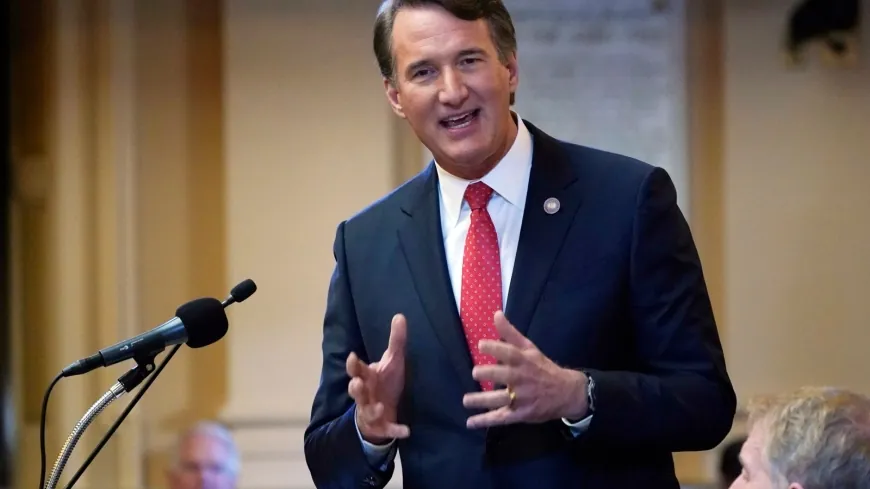Youngkin’s regional carbon market withdrawal was ‘unlawful,’ judge finds

RICHMOND, Va. (WRIC) – A judge has ruled that Republican Gov. Glenn Youngkin’s effort to withdraw Virginia from the Regional Greenhouse Gas Initiative was illegal "and therefore void as a matter of law."
The initiative, also known as RGGI, is a multistate effort aimed at reducing power sector carbon dioxide emissions, requiring power generators that emit CO2 – a greenhouse gas — into the atmosphere to buy allowances for every ton they emit at quarterly auctions.
The General Assembly passed the Clean Energy and Community Flood Preparedness Act in 2020 requiring Virginia to take part in “a market-based trading program consistent with RGGI.” The carbon market includes 11 states that must set a cap on CO2 emissions, which eventually decline over time to lower emissions in the region.
After taking steps to leave RGGI under Gov. Youngkin, including an executive order directing the Department of Environmental Quality to start the removal process, Virginia repealed the RGGI regulation in August 2023.
The Association of Energy Conservation Professionals and others sued Virginia’s State Air Pollution Control Board, the state Department of Environmental Quality and the DEQ director challenging the move to withdraw the commonwealth from RGGI -- a case that was ultimately transferred to Floyd County Circuit Court last November.
The association -- along with Virginia Democrats and environmental advocacy groups not involved in the case -- argued that the Youngkin administration lacked the power to withdraw the commonwealth from RGGI.
On Monday, a Floyd County Circuit Court judge agreed that “the only body with the authority to repeal the RGGI Regulation would be the General Assembly.”
“This is because a statute, the RGGI Act, requires the RGGI Regulation to exist,” Judge C. Randall Lowe wrote in a Nov. 18 opinion. “If Respondents had merely amended the RGGI Regulation in ways that were not inconsistent with the RGGI Act, it is doubtful that their authority to do so could be challenged. But that is not what happened here.”
Youngkin’s spokesperson, Chrisitan Martinez, said they “respectfully disagree” with the ruling and will seek an appeal.
“Governor Youngkin remains committed to lowering the cost of living for Virginians by continuing to oppose the Regional Greenhouse Gas Initiative, which fails to effectively incentivize emission reductions in the Commonwealth,” Martinez said in a statement, adding Youngkin’s previous claim that “it functions as a regressive tax, hidden in utility, bills passed on to all Virginians.”
Billy Weitzenfeld, the former executive director of the Association of Energy Conservation Professionals, and Chase Counts, the association’s current executive director, praised the ruling as a victory for its members and Virginians.
“All along we knew that the actions taken by the Air Board and DEQ were wrong,” Weitzenfeld said in a statement. “This is a win for communities across Virginia who have benefited from the state’s participation in RGGI in the past and those that now will have a chance to continue to see those benefits.”
Youngkin called for pulling Virginia out of the regional carbon market since before he was sworn into office, claiming it's “bad for Virginians” and a tax because utilities can pass RGGI fees onto ratepayers.
Environmental advocacy groups and supporters of RGGI say the market-based, cap-and-invest regional program — with its limited supply of allowances — has helped reduce the emission of greenhouse gases in the region and gives a way to address climate change.
Democrats also celebrated the judge's decision, lauding it as a "win" and criticizing the Youngkin administration over its bid to remove Virginia from the carbon market.
“This is not only a win for every Virginian who has faced the devastating impact of severe flooding, but a win for all Virginians, their wallets, and our environment,” said Virginia House Speaker Don Scott (D-Portsmouth). “Programs funded by RGGI have helped Virginians cut household energy costs, helped protect communities from floodwaters, and have been critical in the fight to cut pollution and address climate change."
Virginia Senate Majority Leader Scott Surovell (D-Fairfax County) said he was “pleased” with the ruling but claimed that Youngkin’s effort cost Virginians.
“Unfortunately, his decision has now cost Virginians over $200 million dollars of funds that could have been appropriated in the last two years to protect the Commonwealth against flood damage like what just happened in Southwest Virginia because of Hurricane Helene,” Sen. Surovell said in a statement.
Republican leaders in the Virginia Senate came out in support of Youngkin’s plans to appeal, also calling RGGI a “tax” on Virginians.
“Make no mistake, RGGI is a tax on every family’s energy bill,” Virginia Senate Republican Leader Ryan McDougle (Hanover) said in a statement.

 VENN
VENN 





